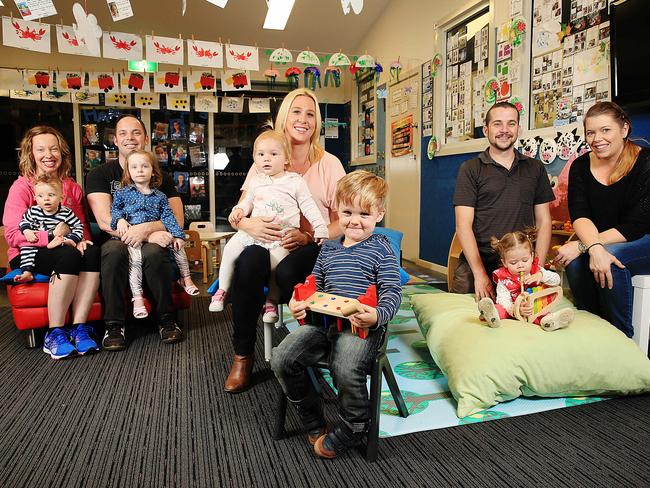Budget 2015: Abbott government’s generous childcare plan a bonanza for some families
FAMILIES earning $60,000 a year with three children would be entitled to childcare subsidies worth more than their entire pay packet under the Abbott government’s generous new families package.

Fed Budget
Don't miss out on the headlines from Fed Budget. Followed categories will be added to My News.
FAMILIES earning $60,000 a year with three children would be entitled to childcare subsidies worth more than their entire pay packet under the Abbott government’s generous new families package.
And parents do not even have to hold down a job to qualify but could merely undertake as little as four hours of volunteering a week to receive subsidies for up to 18 hours of childcare.
The new scheme — which the government claims will push parents back to work — will cost more than $1.4 billion a year from July 2017.
TREASURER JOE HOCKEY JUMPSTARTS AUSTRALIA’S ENGINE
WORKING PARENTS WITH CHILDREN ARE THE BIGGEST WINNERS
Families earning up to $60,000 a year would be eligible for up to $21,658 in subsidies per child if both parents were “active” for at least 24.5 hours a week — even if this was studying or volunteering. This would equal $64,974 in subsidies for three children in long-day care for 50 hours a week, budget estimates show.

But the subsidies, paid direct to childcare operators, could be even higher as the budget calculations are based on an hourly childcare rate of $9.80 an hour, even though the government will subsidise rates to up to $11.55 an hour.
High-income families on more than $185,000 would also receive up to $10,000 a year for childcare — but government officials declined to reveal how much this entitlement would cost taxpayers.
About $37,500 in subsidies would be paid to families earning up to $100,000 a year with two children in childcare for up to 50 hours a week.
Treasurer Joe Hockey said the $3.5 billion in extra funding over five years was designed to encourage more people to rejoin the workforce after having children.
“We want to give parents a choice about work and by investing this money we are responding to the demands of 165,000 parents who want to work more but are prevented from doing so by the costly and complex scheme,’’ he said.
But the new system — under which families earning about $65,000 will have 85 per cent of their childcare fees paid for — will not be implemented until July 1, 2017, after the next election.

Prime Minister Tony Abbott has also signalled that the new childcare subsidies will be dependent on the Senate approving controversial cutbacks to family assistance payments, which are presently being blocked.
These stalled cutbacks total $8.66 billion over the next four years and have been included as savings in the budget’s forward estimates even though key Senators have voiced strong opposition, a Finance Department official confirmed yesterday.
The government also revealed yesterday it is now moving to scrap the Large Family Supplement of Family Tax Benefit Part A, which would achieve savings of about $60 million a year.
From January next year families will only be able to receive FTB part A for six weeks in a 12-month period while overseas. Family Tax Benefit B will also cut off at $100,000 instead of $150,000
The new childcare subsidies replace the Child Care Benefit, Child Care Rebate and the Jobs, Education and Training Childcare Fee Assistance payments.

Under the existing scheme, all families receive subsidies for up to 24 hours of childcare per child a week, regardless of the parents’ work status. But to qualify for subsidies under the new scheme, the least active parent must “work” for at least four hours a week which could include training, study or “any other recognised activity such as volunteering”.
If the least-active parent volunteered for 8.5 hours a week, they would be entitled for subsidies of up to 36 hours of childcare a week.
The government also confirmed it is moving ahead with a pilot program to provide subsidies for some families using nannies at home.
“Shift workers such as nurses, police, firefighters and ambulance officers are often unable to access government-supported child care because of the unpredictable nature and the hours of their work,’’ the government said. The two-year pilot program will cost $250 million and begin next January.
Big help for families with little treasures
Sarah Crawford
MARK and Sarah Guptill, 36 and 37, will receive $7498 in fee relief each year under the childcare reforms.
Mr Guptill works full-time as an insurance accounts manager while Ms Guptill runs a personal training business. Their daughter Millie, 2, is in childcare two days a week but Ms Guptill was considering reducing her work hours to save on care costs for baby son Dane when he is older.
The Castle Hill couple’s combined income of between $100,000 and $150,000 makes them eligible for a larger rebate under the reforms.
They would receive $7498 a year fee assistance for the 20 hours of childcare they currently use each week — which would leave them up to $30 a week better off. When the reforms come into effect in July 2017, baby Dane will also be in childcare which means they will receive even more fee assistance for their two children.

But Ms Guptill said the increased rebate for childcare would be a relief, she just wished it would come in before 2017.
“We won’t get that much benefit because Millie will be going to school in 2018. Dane will then be in care but by that stage it will maybe be six months and she will be in school.”
The couple also liked the idea of subsidised nannies, saying they would “definitely” consider stay-at-home care if it was more affordable.
Alycia and Mark Atkins, 32 and 35, of Stanhope Gardens will also receive up to $7498 in fee relief.
The Atkins’ income of just under $100,000 a year would qualify them for $7498 annual fee assistance for daughter Lily’s 20 hours of childcare a week — which currently costs them $135 a week after rebates.
Ms Atkins, who is pregnant, said cheaper childcare would help when their second child was born.
“Two days (of childcare) is manageable for us for one child but we have considered reducing it in the future once more children are in the picture as the financial cost of sending multiple children to day care would outweigh my income,” Ms Atkins said. “This would help us.”

Ms Atkins said the cost of childcare was a big issue for working women and the possibility of subsidised nannies had sparked a social media debate over the benefits of out-of-home care versus an in-house carer.
The child care reforms would mean working parents Rosey and Daniel Bothamley, 32 and 33, could afford to put their children back into full-time care.
The Glenorie couple had to take Jake, 3, and Summer, 1, out of full-time childcare in December because they had reached the annual rebate cap of $7500. Without the 50 per cent rebate they faced a childcare bill of $920 a week for full-time care — $11,960 for six months. Instead they have cut back to two days a week and juggled the children between family and “amazing friends”. Their income of between $100,000 and $150,000 means there will be no rebate cap under the reforms and they could put both children back into full-time care — with a saving of $11,960 in out of pocket expenses each year.
“If I can get the 50 per cent rebate and it is not capped it will make my life so much easier,” Ms Bothamley said. “I just wish it wasn’t two years away.”
Originally published as Budget 2015: Abbott government’s generous childcare plan a bonanza for some families


